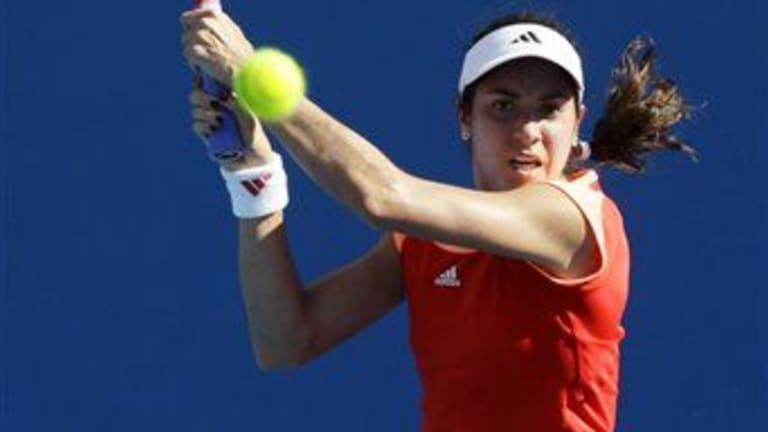MELBOURNE—The afternoons of side-court singles madness at the Slams don’t last long. It was only the third day of the Australian Open, but the grounds had already begun to fill with doubles matches. By the weekend, everything will be contained inside Melbourne Park’s arenas, where the big names will get down to the serious business of putting themselves in the history books.
But as of this afternoon there was still a freewheeling sense to the event, as if it hadn’t taken definite shape yet, as if anything could still happen. Here are a few of the things that did. With Rafael Nadal ending the proceedings early in Rod Laver Arena, and Roger Federer getting a walkover in Hisense, there were plenty of fans milling everywhere else.
“That was the best serve I hit all day, man.”
Mardy Fish can’t let it go. He has cracked what he thinks is an ace up the T against Alejandro Falla. The ball is called out. Fish protests—“Really?” he says to the chair umpire. “Really!?"—but with no Hawk-Eye available and an umpire unwilling to overrule, he's left without any options. Except to keep talking about it. Fish jaws with the umpire as he walks past him; he jaws with him as he sits in his seat; he’s still jawing as he walks back onto the court 90 seconds later.
It’s one of those days for Fish, who will become the highest men’s seed to fall thus far. Last year he was sick and started the season poorly; 2012 is looking like a rerun, and it’s not doing much for his mood. In the third set, Falla gets under his skin by calling the trainer despite being up two sets to love. Afterward, Fish sarcastically says that he noticed Falla was “struggling” out there—“struggling” comes with a set of air quotes.
Fish is a common case study today: A tennis player who can't forget, who can't take the edge off. The towels don’t get to him fast enough between games. A new pair of shoes doesn’t make it quickly enough to him between sets. When it's over, Fish bashes his racquet against his bag and lets out what one observer describes as an “impressive string of expletives.”
By the time he gets to the interview room afterward, Fish isn't as talkative. Asked what happened today, he shrugs.
“Didn’t play well,” is his answer.
“Come on, Christina!” says an American man in the stands around Court 8.
“Come on, Marina!” say two dozen Australian fans in response. The words are contagious; they begin to echo through the packed bleachers.
“Christina” is Christina McHale of New Jersey. “Marina” is Marina Erakovic of New Zealand. The latter has the crowd on her side. They jam every seat on this medium-sized side court and spill out into the walkways surrounding it. People crane their necks around the fences and crouch below the windscreens to get a glimpse.
Erakovic wins the first set and appears ready to break McHale’s serve at 5-5 in the second. There’s a roar for Erakovic's winner; dead silence McHale's. Erakovic hits a ball that looks like it’s going to get past McHale. Half the fans stand and begin to cheer, until McHale sticks out her racquet and the ball reappears, floating back over the net. Everyone sits down in a hurry and starts to laugh. McHale, somehow, saves break points, holds, and goes on to win the set in a tiebreaker.
One of McHale’s former coaches says that, mentally, she was the strongest player he ever coached, "because she could forget.” She knew exactly what mattered and what didn’t matter, and never worried for a second about what didn’t matter.
When McHale wins the second set, Erakovic takes a possibly-strategically-timed bathroom break. She takes a long time getting back to the court. Finally, McHale gets up to talk to the umpire. It looks like she’s going to complain about the delay. Instead, she asks which side she’s going to be on to start the third set. When the umpire tells her, she walks to the baseline and gets ready to play. She wins the match.
“You got this, Donald. You got this, man!”
Donald Young is losing to qualifier Lukas Lacko. He’s on the run and scrambling in nearly every rally. His only response appears to be a flick crosscourt forehand that sends his opponent way out of court. Otherwise, Lacko is cruising. He doesn’t even get agitated when he makes an easy error; that's never a good sign if you’re the opponent.
Young is beginning to steam. After an overrule goes against him, he runs toward the chair and yells, “No, please!” After a winner goes by him, he picks up the ball and throws it into the corner of the court. After an overrule goes his way, he throws his arms in the air in sarcastic joy.
During this time, there are three teenagers sprawled in the stands cheering Young on. One is in a tank top and has his bare feet over the seat in front of him. Another has a pink baselball hat pulled backward over his big shock of curly hair. A third, shirtless, is stretched across three seats, looking up at the sky, working on his tan. They’re laughing, they’re giggling, they’re having a great day in the sun.
Donald Young is aced. He takes the ball and drills it into the tarp behind him. The kid in the pink hat yells, “No problem, Donald, you got this!”
Easy for him—and the rest of us having a nice day in the sun—to say. Young loses in four.
